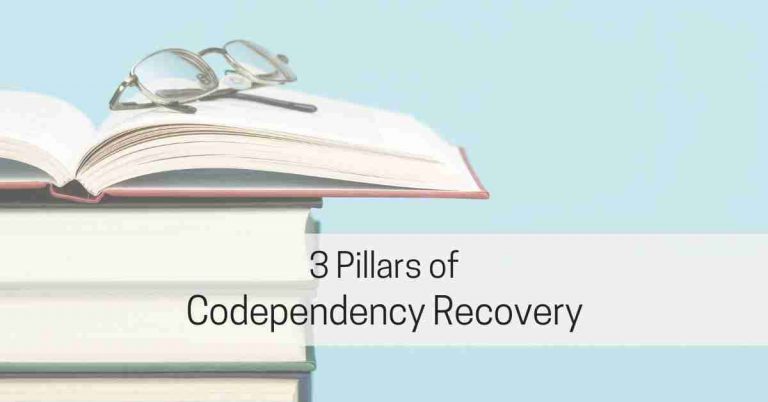
Codependency is a complex set of traits and interpersonal dynamics. Recovery can feel overwhelming—especially in the beginning. To help you get started, I’ll describe three pillars of the framework I developed for codependency recovery and offer some reflective questions to aid you in changing your codependent thoughts and behaviors.
The three pillars of codependency recovery are:
- Know yourself.
- Love yourself.
- Be yourself.
These core tasks target the low self-worth that’s at the root of codependency. People with codependent traits tend to focus on other people’s feelings, problems, needs, and wants. As a result, they’re always working to prove themselves, make others happy, fix and change others, and suppress their own feelings. But when you have a strong sense of self, you’ll feel more confident and make choices that are in your best interest, so you can live a meaningful and fulfilling life.
Know Yourself: Discover Who You Are.
Enmeshment in codependent families prevents us from developing a strong, independent sense of self. deep understanding of ourselves. Fear and manipulation are commonly used in codependent and dysfunctional families to pressure children to conform to family norms, and they are not allowed or encouraged to explore their interests and beliefs.
As children, we learned to suppress our feelings, opinions, needs, and interests to please others and avoid conflicts.
In adulthood, we tend to stay enmeshed or focus on other people such that we don’t know who we are, what we like, or what we want. We become defined by our roles (husband, mother, teacher, etc.) instead of being seen as the complex individuals that we are. Codependency recovery, therefore, must include getting to know ourselves.
Rediscovering yourself isn’t something you do in a weekend or even a week! Generally, it involves brainstorming and experimenting to see what you like to do, and trying on different ideas, opinions, and beliefs.
Finding your true self requires that you turn inward, focus less on others, and pay attention to what your mind, body, and spirit are telling you.
Remember, getting to know ourselves isn’t self-centered or selfish. Knowing and respecting ourselves reflects healthy self-esteem.
Reflective Questions:
- What do you like to do for fun?
- How do you want to be treated?
- What are your goals?
- What do you value?
Love Yourself: Treat Yourself with Compassion and Know You’re Worthy.
Feeling worthless, insecure, and unlovable are at the core of codependency. Our focus on pacifying, pleasing, and taking care of others, coupled with fears of rejection and inadequacy often keep us stuck in unsatisfying relationships where we accept disrespect, abuse, or loneliness.
To recover, we must courageously love ourselves. We can do this through self-compassion, accepting our imperfections and mistakes, and regular self-care.
Self-love is saying something kind to yourself instead of being self-critical or exaggerating your flaws.
Self-love is prioritizing your physical needs such as getting enough sleep, eating nutritious foods, exercising, and taking medications as prescribed.
Self-love is also setting boundaries, stating your opinion, asking for what you need, and making time for fun and social connections.
If you’re not used to taking care of yourself, it may feel uncomfortable for a while, but with each small act of self-compassion or self-care, you are taking concrete steps to love yourself more.
The most important thing to remember about self-love is that it doesn’t have to be earned. Love should be unconditional. Love yourself no matter what you’ve done or whether you think you deserve it. Love has the power to transform you for the better.
Reflective Questions:
- What’s one thing you can do for your emotional health this week?
- What’s one thing you can do for your physical health this week?
- What do you usually say to yourself when you mess up? What could you say instead that would be understanding and supportive?
Be Yourself: Live Authentically.
It can be scary to be yourself—to show up as your flawed, unique, and quirky self. You may worry that people won’t like you, they’ll reject, leave, or judge you. These are painful experiences and wanting to avoid them is understandable. For many of us, it feels safer to be who people want us to be. To please others or avoid conflicts, we engage in people-pleasing and perfectionism.
People with codependent traits struggle to share their authentic selves. This makes sense; if you don’t know who you are or don’t feel good about yourself, you’re going to have a hard time trusting others enough to be vulnerable and authentic.
In contrast, when you know and love yourself, you can show up as you are rather than being a chameleon. You can embrace what you like and believe in, rather than feeling embarrassed or worrying that others will think your interests and ideas are stupid or uncool.
When you know and love yourself, you’re less dependent on others to validate your worth. You’re free to be yourself because you’re confident about your identity and values.
Reflective Questions:
- What does living authentically mean to you?
- What’s one thing you can do this week to live more authentically?
Recovering from codependency is a challenging process. Try to Use these three pillars—know yourself, love yourself, and be yourself—to guide your codependency recovery.
Free Resources
My free resource library has dozens of worksheets, handouts, meditations, and other tools to support your codependency recovery. Sign-up below and be sure to check out the self-validation worksheet and know yourself better tools.
© Dr. Sharon Martin. Adapted from an article the author published on PsychologyToday.com.
Source:Dr. Sharon Martin , www.livewellwithsharonmartin.com, [publish_date
Source Link